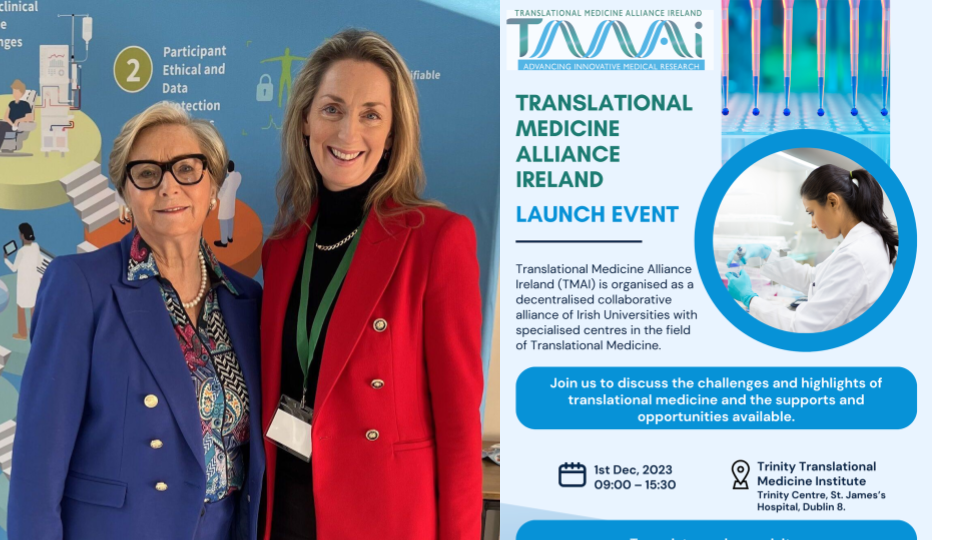Alliance formed to “push new boundaries” in translational medicine
Thursday, 18 January, 2024
On December 1st, 2023, the Translational Medicine Alliance of Ireland (TMAI) was launched in the Trinity Centre, St James’s Hospital, Dublin. TMAI is a new initiative bringing together expertise from ten Irish universities, supported by the Department of Further and Higher Education and Horizon Europe funding.

Pictured: Frances Fitzgerald, MEP and Professor Patricia Maguire, UCD
Translating scientific discoveries into practical healthcare applications can be incredibly complex. Challenges include bridging science and business, navigating the regulatory approval process and managing and analysing data.
Now a visionary new alliance of universities will strategically tackle these hurdles together to enhance the collective impact and efficiency of translational research.
The Translational Medicine Alliance of Ireland (TMAI) is directed by Aideen Long, professor of clinical medicine at Trinity College Dublin. She is supported by a team of ten academics from Irish universities, including UCD Discovery director Professor Patricia Maguire.
TMAI aims to bring together researchers, clinicians, patients and industry partners to foster collaboration and innovation in translational medicine.
By promoting multidisciplinary clinical research the initiative seeks to expedite and unlock potential treatment benefits for patients.
TMAI’s efforts are bolstered by engagement with EATRIS, the European infrastructure for translational medicine, whose mantra is “nothing about patients without patients”.
Indeed, patient focus was a theme of the day.
“The patient - the individual, the person - is always at the centre of everything,” stressed Prof Long, opening the inaugural session.
The patient - the individual, the person - is always at the centre of everything,” stressed Prof Long, opening the inaugural session.
Welcoming representatives from across Irish academia, she highlighted Ireland’s rich history in translational research and biotechnology.
Prof Long then gave an overview of the translational medicine cycle, which begins with identifying medical problems, necessitating ethical approvals and navigating through data regulations such as GDPR and DPIA. The subsequent steps involve collecting samples, engaging in research, analysing data, and eventually translating findings into practical applications.
“There are many challenges associated with that,” she added. “We have to be aware of them and face them and really try to push that on.”
Prof Patricia Maguire spoke about her multi award-winning project AI_PREMie, a novel blood test which will use AI to improve diagnostics for the dangerous pregnancy condition preeclampsia.
"AI_PREMie is all about making data-driven decisions and assisting in clinical decision making," she said, after explaining how every seven minutes a woman dies and every 45 seconds a baby dies from preeclampsia complications. "Yet we still diagnose it by looking at protein in urine and blood pressure. The lack of advances in this clear area of unmet need is very disappointing."
"AI_PREMie is all about making data-driven decisions and assisting in clinical decision making," she said, after explaining how every seven minutes a woman dies and every 45 seconds a baby dies from preeclampsia complications.
Though AI_PREMie has won a slew of accolades, including a UNESCO Global Top 100 project using AI to address the Sustainable Development Goals, Prof Maguire spoke about how difficult it can be to get projects to the next level, suggesting there are many troubleshooting considerations.
“Will busy clinicians actually use your product? Will it help them? Will they find value in it? Will it meet the demands of a busy hospital environment? How do you ensure the software never crashes? You need steadfast solutions for care providers built on trustworthy data.”
Keynote speaker at the launch was Frances Fitzgerald MEP, who said collaboration in translational medicine is “the way of the future”. She highlighted the need for experts in both legislation and communications on all research teams, to ensure that the important work of scientists has more reach and impact.
“If you want to get more visibility to your work, I would suggest very strongly having someone on your team develop real expertise in how legislation, for example, goes through the parliament. I know there's a lot of experience in terms of thinking about research, but also to think in terms of getting the public to understand what you're doing, which is so important, as well, in terms of increasing your visibility and therefore increasing your chances of funding.”
Other speakers on the programme included Prof Mark Lawler, Queen's University Belfast, who gave a presentation on the importance of data in translational medicine for cancer, and Dr Aideen Ryan, who spoke about cell therapy expertise at the University of Galway. There was a panel discussion on Patient and Public Involvement (PPI) in research in which UCD’s Emma Dorries spoke about what PPI really means in practice, and a talk on Horizon Europe funding by Dr Martha Cahill of Enterprise Ireland.
More information at (opens in a new window)https://tmai.ie/ or read (opens in a new window)Silicon Republic article below.